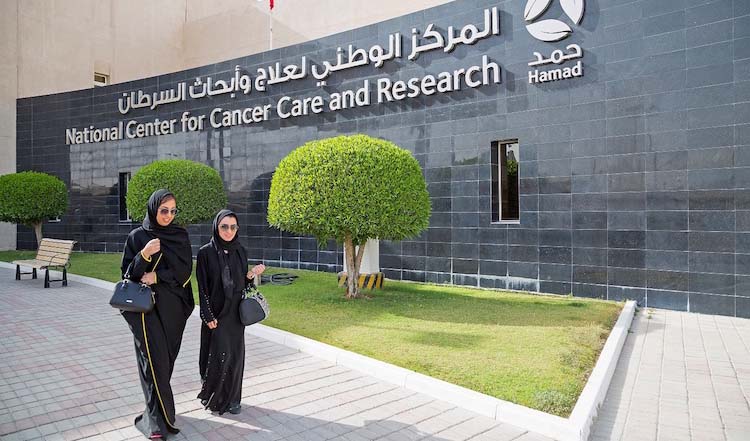It was announced in March that all cancer treatment at the Hamad Medical Corporation (HMC) oncology department is now free for all residents. Previously, any costs for cancer treatment was split – patients had to pay 20%, with 80% paid for by the government. Now, the remaining 20% is also covered to provide free treatment to citizens and residents.
Speaking in an interview with local newspaper Al Arab, Dr Osama Al Homsi, Haematology and Oncology Chairman and Senior Consultant at HMC’s National Centre for Cancer Care and Research, stated that there is continuous progress in the treatment of tumours and medicine in general. HMC are keen to bring to Qatar new developments in the treatment of tumours, especially with regard to such things as immunological drugs, given the amount of research in this particular field of expertise.
He went on to say ‘We will import any medicine that we need for the health of our patients to be included in the list of recognised medicines in the country. Providing treatment free of charge to all patients helps many patients, especially since 20% of the amount can sometimes be large, because of the high price of cancer drugs.’
Additionally according to Dr Al Homsi, 16 committees have been formed to assess the cases of patients and determine the most suitable treatment. Each team is specialised in the surgery of a different type of cancer.
The National Centre for Cancer Care and Research (NCCCR) is keen to provide alternative treatment options for patients so that they do not need to be admitted, by using a mobile medical unit that can visit them at home, offering the same level of treatment as that given at the hospital.
NCCCR is the leading cancer hospital for the State of Qatar and part of HMC, and looks after cancer patients who require ongoing treatments such as chemotherapy and radiotherapy. The National Cancer Strategy for Qatar, launched in 2011, gave a number of recommendations for improving the service offered to cancer patients, which have been translated into direct improvements in patient care at NCCCR.
Since the opening of the Hereditary Cancer and High-Risk Screening Clinic in 2013, the genetic counselling and testing service offered by NCCCR has given assessments to more than 2,000 patients resulting in a decreased risk of cancer, early detection, and appropriate treatment. In 2017, 800 patients were referred for evaluation associated with their risk of hereditary cancer.
The service provides a comprehensive genetic risk assessment for those concerned about their cancer risk due to personal and/or family history.
The country’s first breast and bowel cancer screening facility opened at the Al Wakra Health Centre in January 2016, a major step in efforts towards ensuring the health and wellbeing of all citizens and residents. This was followed up by the launch of a mobile unit, and screening suites have subsequently opened at Rawdat Al Khail and Leabaib health centres.
The Al Wakra facility opened in conjunction with the launch of ‘Screen for Life’, a life-saving programme by the Primary Health Care Corporation (PHCC) that promotes education, awareness and early detection of cancer in Qatar. The implementation of the programme is consistent with a key recommendation of the National Cancer Strategy, which states the need in Qatar for a population-based cancer screening programme.
The core objective of ‘the Screen for Life’ campaign is to save lives by encouraging women aged 45 years or older with no symptoms to receive breast cancer screening through mammography. The campaign also calls on both men and women aged 50 years or older with no symptoms to receive bowel cancer screening through FIT (Faecal Immunochemical Test).
The Ministry of Public Health has recommended breast cancer screening every three years and bowel cancer screening every year. Both mammogram and FIT are generally considered safe, quick and relatively painless.
Campaign to raise awareness about thyroid cancer
Qatar Cancer Society (QCS) has launched the ‘Your Health Is Your Responsibility’ campaign to raise awareness about thyroid cancer, which is the second most common cancer among women in Qatar.
Thyroid cancer can occur at any age and presents approximately three times more often in women (who are usually in their 40s or 50s when diagnosed) than in men (usually in their 60s or 70s). Symptoms include a lump or swelling in the neck which sometimes grows quickly, pain in the front of the neck which may radiate up to the ears, hoarseness or other voice changes that do not go away, trouble swallowing or breathing, and a persistent cough.
According to Dr Hadi Abu Rasheed, Supervisor of Health Education at QCS, to prevent thyroid cancer one should reduce exposure to radiation and environmental pollution, undergo genetic testing or preventative surgery if patients have a family history of the disease, and follow a healthy diet with a high iodine intake – foods such as seafood and sea vegetables (eg kelp), eggs and dairy products, strawberries, and cranberries.
Early detection is important, with QCS recommending screening and blood tests at least once a year to detect any abnormal levels of thyroid stimulating hormone (TSH).
For more information about Screen for Life visit screenforlife.qa or call 800 1112. To learn more about NCCCR, see Healthcare in Qatar, in the latest issue of Marhaba Information Guide. Look out for campaigns and events run in association with breast cancer in October and prostate cancer in November.
According to the 2015 National Qatar Cancer Registry, each year there are approximately 550,000 new cases worldwide of cancers of the head, neck, and oral cavity; these account for 4% of the malignant cancers diagnosed in Qatar. Three times as many men are affected as women, with those over the age of 50 most susceptible.
The majority of these cancers are unfortunately diagnosed at a late stage, which makes them more difficult to treat. This may be due to patients experiencing a prolonged period with no symptoms, a delay in seeking medical attention, and late investigation. Major risk factors include tobacco use and alcohol consumption.
However, head and neck cancer treatment has a much better chance of being successful if the right diagnosis is made early. April was Head and Neck Cancer Awareness Month, and HMC wants to use this as the momentum for highlighting the need for the public to become aware of the prevention and early detection of head and neck cancers – and cancer in general.
Author: Sarah Palmer
Copyright © Marhaba Information Guide. Reproduction of material from Marhaba Information Guide’s book or website without written permission is strictly prohibited. Using Marhaba Information Guide’s material without authorisation constitutes as plagiarism as well as copyright infringement.











